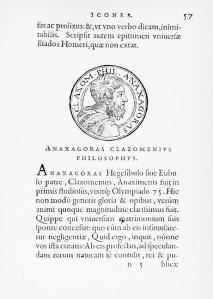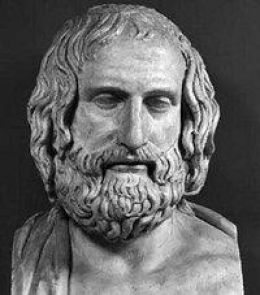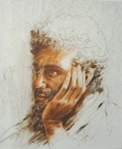Posts Tagged Athens
SAGES
Posted by historyofscience101 in ARISTOTLE, GREEK PHILOSOPHY, INDEX, PLATO, PRE-SOCRATICS on February 23, 2014
THE SEVEN SAGES OF GREECE
Pittacus of Mitylene (c.650 – c.570 BCE) ‘Know thine opportunity’
Thales of Miletus (c.642 – c.545 BCE) ‘Who hateth suretyship is sure’
Solon of Athens (638 – 559 BCE) ‘Know Thyself’
Periander of Corinth (died 585 BCE) ‘Nothing is impossible to industry’
Chilon of Sparta (sixth century BCE) ‘Consider the end’
Bias of Prinene (sixth century BCE) ‘Most men are bad’
Cleobus of Lindoe (sixth century BCE) ‘The golden mean’ or ‘Avoid extremes’
In Athens of the fourth century BCE, empirical science held little appeal. Socrates had an aversion to natural philosophy.
PLATO celebrated mathematics but opposed any form of experimentation.
ARISTOTLE was more receptive to natural philosophy, but practiced little experimentation or even observation.
ANAXAGORAS (c.500 – c.428 BCE)
Posted by historyofscience101 in GREEK PHILOSOPHY, HISTORY OF SCIENCE, PRE-SOCRATICS, THE PRE-SOCRATICS on February 22, 2014
ANAXAGORAS considered the notion of the indivisible particle
Anaxagoras came from Ionia but settled in Athens, where he became a friend of Pericles and remained for 30 years. He was charged with impiety because of his theory that the Sun is a red-hot stone. Such an explanation, denying the role of Helios the sun-god, was enough to warrant prosecution. It seems that he fled Athens before the trial and settled in Asia Minor. The author of one book, now lost, what we know about Anaxagoras is based on references to him by later writers.
In the cosmology of Anaxagoras, the Universe began as a homogenous sea of identical basic particles. Nous gave this sea a stir, in the knowledge that in time the particles would so combine to arrange themselves such that everything would be as it is today.

Nous was a vital principle akin to the life force of vitalism – the nearest English words being ‘mind’ or ‘intellect’.
The range of the word ‘nous’ is vastly greater, however, as it refers to the combination of insight and intuition which permits the apprehension of the fundamental principles of the cosmos – the concept is closer to the oriental idea of ‘seeing’ than the occidental notion of intelligence founded upon EUCLIDEAN LOGIC.
At the same time, Nous could be the creative, motive intelligence behind the cosmos, almost indistinguishable from the Christian concept of the will of God.
PROTAGORAS of ABDERA (c.480 – c.411 BCE)
Posted by historyofscience101 in GREEK PHILOSOPHY on January 25, 2014
Of all things the measure is Man, of the things that are, that they are, and of the things that are not, that they are not.
About the gods, I am not able to know whether they exist or do not exist, nor what they are like in form; for the factors preventing knowledge are many: the obscurity of the subject, and the shortness of human life.
A contemporary of Socrates and later labelled a sophist by Plato, in 415 BCE Protagoras was forced to flee Athens because his works were condemned for impiety.
 PHILOSOPHERS
PHILOSOPHERS



